General
 EMS RETRACS TPIC Sample Indicators for Case Review
EMS Committees - General
November 27, 2013
EMS RETRACS TPIC Sample Indicators for Case Review
EMS Committees - General
November 27, 2013
This document provides examples of indicators for case review. Situations covered include death reviews, scene times greater than 10 minutes, length of stay in a facility for more than 2 hours prior to transfer to a tertiary care center, diversions, and emergency medical services run sheet availability on medical record within 24 hours of emergency room admission.
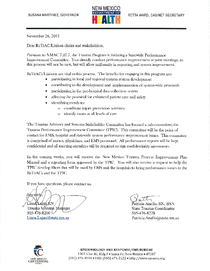 EMS RETRACS TPIC Introduction Letter
EMS Committees - General
November 26, 2013
EMS RETRACS TPIC Introduction Letter
EMS Committees - General
November 26, 2013
Letter from the trauma systems manager introducing the trauma performance improvement committee.
 EMS TASSC Memership List
EMS Committees - General
October 24, 2013
EMS TASSC Memership List
EMS Committees - General
October 24, 2013
This is the current member list for the trauma advisory and system stakeholders committee.
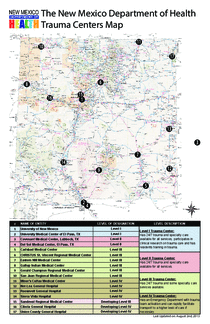 EMS Trauma Center Map
EMS Trauma Care Program - General
October 8, 2013
EMS Trauma Center Map
EMS Trauma Care Program - General
October 8, 2013
This is a map of emergency medical services trauma centers in New Mexico.
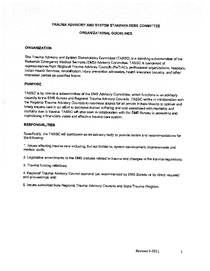 EMS TASSC Organizational Guidelines
EMS Committees - General
October 1, 2013
EMS TASSC Organizational Guidelines
EMS Committees - General
October 1, 2013
This document describes the trauma advisory and system stakeholders committee including an overview of the organization, purpose, responsibilities, membership, quorum, appointment to membership, term of membership, ex-officio members, removal from the committee, officers, standing subcommittees, conduct, and scheduling of meetings.
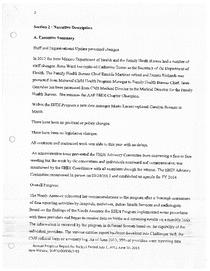 EHDI Advisory Council Program Summary
Children's Medical Services - General
September 30, 2013
EHDI Advisory Council Program Summary
Children's Medical Services - General
September 30, 2013
This is an annual progress report for budget period July 1, 2012 – June 30, 2013.
 EHDI Advisory Council Program Update
Children's Medical Services - General
July 10, 2013
EHDI Advisory Council Program Update
Children's Medical Services - General
July 10, 2013
The New Mexico Newborn Hearing Screening Program is designed to oversee the newborn hearing screenings, diagnostic evaluations and referrals to the early intervention process through a tracking system. The program assists in identifying those newborns with hearing loss, as soon as possible, so the ability to develop communication and social skills is obtained at the earliest stage.
 Emerging Infections Program Publications Listing
Emerging Infections - General
July 2, 2013
Emerging Infections Program Publications Listing
Emerging Infections - General
July 2, 2013
This document contains a complete listing of New Mexico Emerging Infections Program peer-reviewed articles, reports & updates, and conference abstracts.
 Risk Factors Associated with Hearing Loss in Childhood
Children's Medical Services - General
December 14, 2012
Risk Factors Associated with Hearing Loss in Childhood
Children's Medical Services - General
December 14, 2012
Provides a comprehensive list of risk factors that are associated with permanent congenital, delayed onset or progressive hearing loss in childhood.
 Screener Competencies
Children's Medical Services - General
December 14, 2012
Screener Competencies
Children's Medical Services - General
December 14, 2012
Describes the competencies and skills required by all newborn hearing screeners.
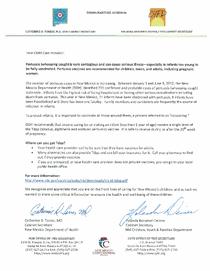 Pertussis Letter to Childcare Providers
Pertussis - General
June 22, 2012
Pertussis Letter to Childcare Providers
Pertussis - General
June 22, 2012
Letter from New Mexico Department of Health about Pertussis for childcare providers.
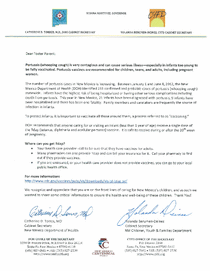 Pertussis Letter to Foster Parents
Pertussis - General
June 22, 2012
Pertussis Letter to Foster Parents
Pertussis - General
June 22, 2012
Letter from New Mexico Department of Health about Pertussis for foster parents.
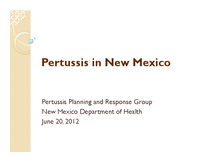 Pertussis in New Mexico Presentation
Pertussis - General
June 22, 2012
Pertussis in New Mexico Presentation
Pertussis - General
June 22, 2012
Overview slide show of Pertussis in New Mexico.
 EMS TSFA Trauma System Development Guidelines & Procedures
EMS Committees - General
March 21, 2012
EMS TSFA Trauma System Development Guidelines & Procedures
EMS Committees - General
March 21, 2012
These general guidelines were established for trauma system development funding use. However, the Trauma System Fund Authority delegated the application process and the review of all applications to the Trauma Advisory and System Stakeholders Committee who presents prioritized funding recommendations back to the Trauma System Fund Authority, which has final authority for funding allocations.
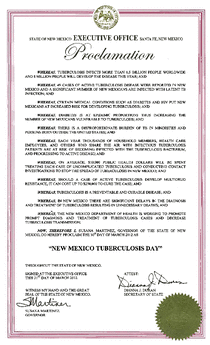 Tuberculosis Day Proclamation
Tuberculosis Prevention - General
March 21, 2012
Tuberculosis Day Proclamation
Tuberculosis Prevention - General
March 21, 2012
This proclamation was passed to set tuberculosis day as the 30th of March 2012.
 Assessment of Healthy Homes Needs
Healthy Homes - General
March 13, 2012
Assessment of Healthy Homes Needs
Healthy Homes - General
March 13, 2012
Healthy Home initiatives are a response to scientific evidence that links substandard housing and poor health. Healthy Home interventions take a holistic approach to coordinated mitigation of housing related hazards, rather than addressing a single hazard at a time and this approach allows practitioners to address a wide array of health and safety issues.
 Methicillin-Resistant Staphylococcus Aureus
Zoonotic Diseases - General
November 22, 2011
Methicillin-Resistant Staphylococcus Aureus
Zoonotic Diseases - General
November 22, 2011
Fact sheet about Methicillin-Resistant Staphylococcus Aureus.
 EMS Critical Incident Stress Management Primer
EMS Critical Incident Stress Management - General
August 5, 2011
EMS Critical Incident Stress Management Primer
EMS Critical Incident Stress Management - General
August 5, 2011
This document serves as a primer for learning about critical incident stress management.
 Overdose/Naloxone 3 Hour Training Curriculum (Old)
Harm Reduction - General
August 3, 2011
Overdose/Naloxone 3 Hour Training Curriculum (Old)
Harm Reduction - General
August 3, 2011
This curriculum is old and is only available for historical purposes.
 Effects of Varying Concentrations of Bleach on in vitro HIV-1 Replication & Relevance to Injection Drug Use
Harm Reduction - General
August 3, 2011
Effects of Varying Concentrations of Bleach on in vitro HIV-1 Replication & Relevance to Injection Drug Use
Harm Reduction - General
August 3, 2011
The use of bleach as a disinfectant for drug injection equipment in the intravenous-drug-using population was recommended early in the HIV-1/AIDS epidemic. Epidemiological studies have challenged the use of bleach as an effective measure to prevent HIV-1 transmission.


